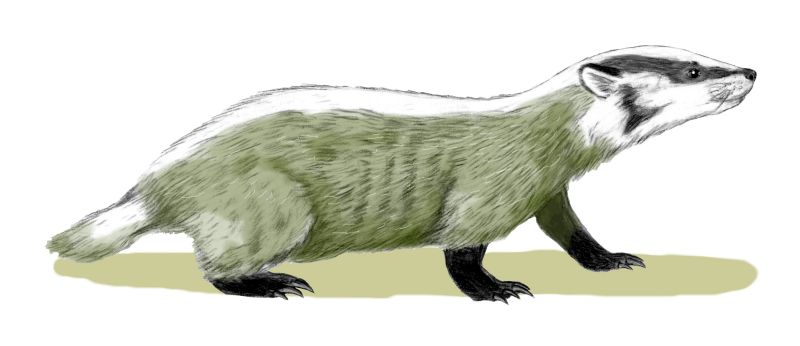|
| 질의: description | 결과: 9642번째/10150 | |
Chamitataxus avitus (Prehistoric Badger) - Wiki
| 제목: | Chamitataxus avitus (Prehistoric Badger) - Wiki
| |

| 해상도: 800x346
파일크기: 29145 Bytes
등록시간: 2007:10:23 10:48:52
|
Chamitataxus
From Wikipedia, the free encyclopedia
[Photo] Chamitataxus avitus, a badger from the Miocene of New Mexico, pencil drawing. Date June 17, 2007. Author Arthur Weasley (http://commons.wikimedia.org/wiki/User:ArthurWeasley). __GFDL (2007 Arthur Weasley)__
Chamitataxus was a prehistoric badger genus belonging to the group Fissipedia. Chamitataxus avitus is the only known species of the genus. Chamitataxus lived during the Late Miocene, around 6 million years ago in what is now North America. Out of the three taxidiine badgers to have existed on the continent, Chamitataxus is the most primitive. Very few taxidiine badger remains have been uncovered to date, with only prehistoric Taxidea and Pliotaxidea specimens being discovered prior to the Chamitataxus holotype being found.
Description
Chamitataxus is known only from a single holotype found in 1935, which is comprised of a nearly complete skull. The holotype was discovered in a quarry not far from Lyden, New Mexico, where the prehistoric herbivore Osbornoceros was also discovered. Chamitataxus was indeed named after the rock formation it was discovered in, the Chamita Formation. Due to the relative lack of Chamitataxus specimens, much of the research into the genus is based upon research into better represented taxa related to Chamitataxus, such as Taxidea, the modern badger which existed too in the Late Miocene.
Chamitataxus was fairly similar to its modern day relatives in most respects; it was a carnivore and judging from the skull found, it looked fairly similar. However, because so little of Chamitataxus has been found, estimating its size and other features is impossible; much is unknown about the genus. Chamitataxus had a very good sense of smell and had a firm grip like its modern equivalent and this enabled Chamitataxus to kill burrowing animals with a bite to the neck. Like other mammals, Chamitataxus excelled at hearing low-frequency noises, which it could hear at a long distance. Overall, Chamitataxus was an expert hunter based on scientist’s findings, and was able to prey on many different types of land-dwelling creatures during the Miocene.
http://en.wikipedia.org/wiki/Chamitataxus
| The text in this page is based on the copyrighted Wikipedia article shown in above URL. It is used under the GNU Free Documentation License. You may redistribute it, verbatim or modified, providing that you comply with the terms of the GFDL. |
|
^o^
동물그림창고 똑똑전화 누리집
^o^
|
|